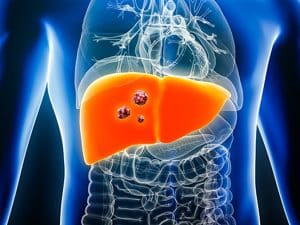The First Liver-directed Treatment for Metastatic Uveal Melanoma
The FDA approved a kit that allows for liver-directed delivery of the chemotherapy melphalan to treat metastatic liver disease from uveal melanoma.
The U.S. Food and Drug Administration (FDA) has approved a kit for hepatic delivery of the chemotherapy agent melphalan (HEPZATO KIT) as a treatment for adult patients with unresectable liver metastases from uveal melanoma, a type of cancer found in the eye. The treatment is indicated for patients whose metastases affect less than 50% of the liver and who have no or limited extrahepatic disease.
Melphalan inhibits the proliferation of cancer cells by damaging DNA and interfering with its replication. Since chemotherapy drugs like melphalan do not discriminate between normal cells and cancer cells, normal cells that divide frequently can also be damaged, resulting in side effects. The newly approved kit includes a device through which melphalan is infused into the hepatic artery. This administration method allows for delivery of a higher dose of chemotherapy to the liver while avoiding systemic toxicity.

The approval was based on results from FOCUS, a single-arm, multicenter, open-label phase III clinical trial in 91 patients with uveal melanoma who had unresectable liver metastases and no extrahepatic disease or extrahepatic metastases limited to the bone, lymph nodes, subcutaneous tissues, or lung that could be resected or treated with radiation therapy. Patients whose liver metastases affected more than 50% of the organ or who had cirrhosis or hepatitis B or C infection were excluded.
Among the study participants, 36.3% experienced an objective response, and the median duration of response was 14 months.
The prescribing information for the HEPZATO KIT included two boxed warnings, one for severe complications that can occur during or shortly after administration, including hemorrhage, hepatocellular injury, and thromboembolic events; and one for myelosuppression that can result in severe infection, bleeding, or symptomatic anemia.
Uveal melanoma, also called intraocular melanoma, is a rare cancer that develops in the middle layer of the eye. Uveal melanoma has a high tendency to spread to other organs. Liver metastases occur in up to 95% of patients with metastatic disease, and these lesions are often unresectable. According to the National Cancer Institute, the mean age-adjusted incidence of uveal melanoma in the U.S. is 4.3 new cases per 1 million people.
The FDA rendered its approval on August 14, 2023.
